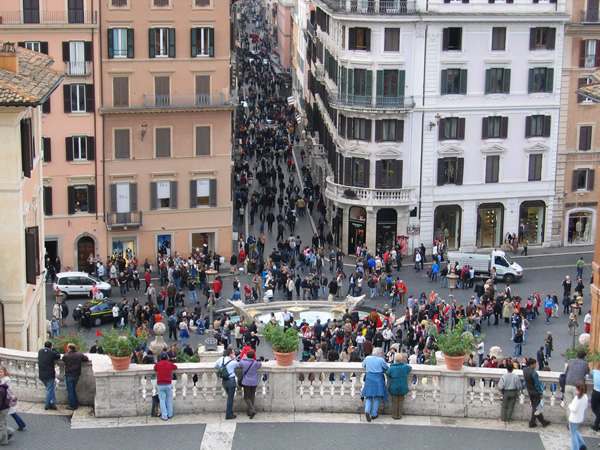Budget Travel Tips: Avoid Crowds Overseas
Advice for a Better (and Cheaper) Experience
By Tim Leffel
|

|
|
Little is affordable around the Spanish Steps in Rome, and once seen, there are far more interesting and less expensive places to wander all over this
great walking city. Photo © Transitions Abroad.
|
There are thousands of strategies that will enable you to travel better for less. Throughout its history, Transitions Abroad has been one of the few magazines that has provided the details on a deeper travel experience issue after issue. I have been proud to add whatever wisdom I could over the years and want to sign off with the advice that trumps all others:
For Cheap Travel, Avoid the Crowds — and the Crowd
Mentality
Consider this the prime directive of traveling well for less money. If you ying while others yang, go left when others go right, and venture abroad when others are staying home, you will have a richer experience. You will also spend far less in the process.
One of the first steps to take is to look at travel media with a very critical eye. The idea of fantasizing about a life you can’t lead yourself is a big part of the “armchair traveler” appeal of most glossy travel magazines. A typical issue contains dozens of advertisements for diamond watches, luxury sports cars, and handbags that retail for over a thousand dollars. Between the ads are stories about resorts we can only dream of frequenting unless we’re in that lofty portion of the population who has far more money than time.
Despite what these magazines would have you believe, only a tiny fraction of the population can afford to travel this way. Other magazines and websites heavily promote cruises and large group tours. These options are more affordable, but they are not for the traveler who wants to really explore an area and a culture in depth.
It is important to remember that travel magazines are driven by advertising. If everyone is going to Prague and those hotels are spending money on ads, it doesn’t make much sense for them to write about the dirt-cheap hotels in the rural Moravia region. If Luang Prabang, Laos finds itself graced by a new luxury hotel, however, you will soon be reading about this city as “the hot place to go this year.” Ignore the hype and the pretty pictures and follow these guidelines to getting more from your money every time.
Eat Where the Locals Eat
This concept seems so simple, but most tourists are too ignorant or scared to follow it. If you want to benefit from local prices and local knowledge about which restaurants are the best in a given area, ask locals who live and eat there. Avoid the tourist institutions and sample what makes a place special. Both your taste buds and your wallet will be happier.
Stay in Locally Owned Hotels and Accommodations
If you’re a backpacker on a budget, you’re probably following this rule already. For those with more money to spend, however, it’s important to remember that supporting the local hotel economy is good for local business and is good for your travel budget. In nearly every case, a small, privately owned hotel or accommodation will provide better service and better rates than a hotel that is part of an international conglomerate.
Know what’s Hot — and Not
“Italy is our Lindsay Lohan,” a travel magazine editor recently told me. By that he meant that anytime they needed to goose up newsstand sales, a cover story about Italy would do the trick. If you want to hang with millions of other tourists, head to Italy, London, the Caribbean, or Hawaii. Otherwise, go to lesser-known spots on the globe to have the place to yourself. You will get better prices on everything from hotels to happy hour drinks.
Pay Attention to Seasons
Europe in the summer is ungodly expensive. So is Brazil in January. Mexico around spring break, or Las Vegas on most any weekend. If you know the peak time and the low season for a destination, you can figure out how to get the most for your travel budget. The best strategy is to travel to a destination during the off-season or “shoulder season,” when the weather is still good but the crowds have thinned out. Find a good guidebook or website that lays it all out by month.
Learn the Ins and Outs of Public Transportation
Whether you like it or not, you will need to become an expert on local bus routes, multi-country train timetables, and the differences between various types of share taxis and minivan services. In short, you need to join the locals when you need a ride. Otherwise, you will join the tourists, which means inflated rental car prices, rapacious taxi drivers, and “special price for you” services that deposit you somewhere far away from what you intended. Taxis are useful and fast, but if you already know where you are going, you can then use them without being taken for a ride.
Consider the Source — Carefully
There are plenty of travel magazines and websites out there, but they are not created equal. Some are aimed at millionaires, some are aimed at those who think taking a cruise is exotic, and some are just aimed at the gullible who will reply to an aggressive sales pitch.
There are a few good guys out there who are really looking out for the independent traveler. First, although the print magazine you are holding will become a part of history, the website will live on at Transitionsabroad.com. Consider it the main anchor in your future travel plans. Branch out from there to find sites you can really trust.
Tim Leffel is author of several books, including A Better Life for Half the Price: How to prosper on less money in the cheapest places to live. See more on his Cheapest Destinations Blog.
|
